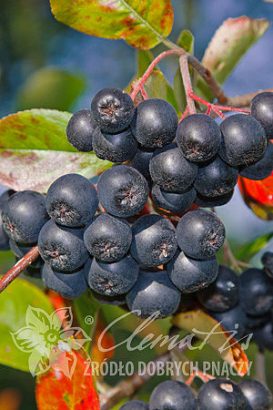Aronia melanocarpa ‘Galicjanka’
Black Chokeberry 'Galicjanka'| Decoration form | leaves which turn red in autumn, edible fruits |
|---|---|
| Color of flowers | white |
| Flowering month | IV |
| Annual growth | 0.5-0 m |
| Aspect | sun, 3/4 sun, 1/2 sun |
| Frost hardiness | Zones 4 - 7 |
| Density on 1m2 | 1 |
| Evergreen plant | no |
A Polish plentiful cultivar, recommended as one of the best for production plantations. Easy to maintain, undemanding and disease resistant. Yields fruit early.
WHAT IT LOOKS LIKE: Straight, upright shoots. Leaves dark green, in autumn turning crimson. Flowers small, white, gathered in corymbs; opening in the second half of May. Berries round, black, covered with waxy film; ripening between August and September.
HOW IT GROWS: An upright shrub in a shape an inverted cone. The habit more compact than the average in the species. Fast growing, reaches 2 m height (0.3–0.5 m per year).
WHERE TO PLANT: Tolerant. Yields best fruit in sunny sites and well-drained soil of neutral to slightly acidic pH. Does not require additional acidifying of the soil, as opposed to highbush blueberry. A robust cultivar, resistant to pest and disease. Frost hardy (zone 4–7).
HOW TO PLANT AND MAINTAIN: Before planting immerse the plant container in water for 10-30 min. Place the root ball in a 40 x 40 x 40 cm hole with a 10 cm layer of well-rotten manure or compost, 0.5-1 cm deeper than it was before. Fill the hole with fertile soil. The plant does not require regular pruning. When the bushes thicken after a couple of years, a thinning may be necessary. Excessive pruning limits the fruition.
HOW TO APPLY: The shrub recommended for amateur cultivation in domestic gardens as well as for plantations (also organic ones). The fruits are rich in vitamin C, contain high quantities of anthocyanins, tannins, pectin and mineral salts as well as antioxidants. They are used for juice, syrup, jam and tincture production. Known for their anti-inflammatory and anti-bacterial properties, contribute to stable glucose levels. A source of food for birds.
ORIGIN: “Sadowniczo-Szkółkarski Zakład Doświadczalny” in Albigowa (Poland).


